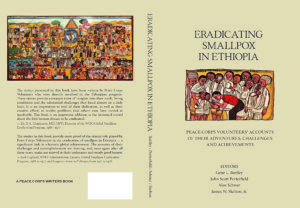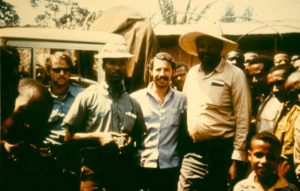ERADICATING SMALLPOX: another time, place, virus — Award Winning Book
Houston lawyer James Skelton recalls his stint with the Peace Corps
This month, the book won the Moritz Thomsen Peace Corps Experience Award, an annual honor for Peace Corps volunteers or staffers who best depict life in the Peace Corps.
“Eradicating Smallpox in Ethiopia” proved a complicated task for Skelton and his co-authors and co-editors. It comprises 18 essays written about efforts between the World Health Organization and the Peace Corps to rid the African nation of the disease in the 1970s.
“There was a certain amount of herding cats involved in this,” says Skelton, now an attorney living in Houston.
He had the initial idea in 2014 while having dinner with Vince Radke, one of the book’s contributors.
“I could just see these stories getting put together while he was talking,” Skelton says. “But I wasn’t aware of how much time it would take.”
 ‘Eradicating Smallpox in Ethiopia’
‘Eradicating Smallpox in Ethiopia’
Edited by James W. Skelton Jr., Gene L. Bartley, John Scott Porterfield and Alan Schnur
Peace Corps Writers Press
486 pages, $19.99 (paperback)

James Skelton
Skelton wasn’t worried about the writers’ recall of the time spent in Ethiopia, as he says, “most of us kept journals, and some of those journals were incredibly detailed. We all had our ways of bringing it back.”
Still, Skelton and his co-editors — Gene L. Bartley, John Scott Porterfield and Alan Schnur — had to take different voices telling different stories about different aspects of the experience and stitch them together into a single entity. One offering came in as a 90-page journal entry.
“I knew that wouldn’t work,” Skelton says. “We needed his view today of what happened then.”
Another challenge was that the group that worked in Ethiopia between 1970 and 1976 was experiencing attrition. Two doctors with the World Health Organization — Dr. Ciro de Quadros and Dr. Donald “D.A.” Henderson — had died. “Eradicating Smallpox in Ethiopia” is dedicated to them, and many of its essays serve as a sort of unofficial tribute. Henderson was the director of the WHO’s Global Smallpox Eradication Program. And de Quadros was the epidemiologist in charge of field operations in the country.
“I think the vast majority of our authors held them in the highest esteem,” Skelton says. “You can see it in how often they’re mentioned in the writings. Some of us dedicated a lot of our chapters to them.”
One of Skelton’s chapters paints a lively portrait of de Quadros, a charismatic and brilliant doctor.
“I just wanted to express how much I thought of the man,” he says. “He was a great example of a taskmaster, but one who did it in a way that made you feel good about your work.”
Together the essays present all manner of challenges the group faced. Some were bureaucratic: The WHO thought its resources might be better spent fighting other illnesses, particularly malaria, in other nations, even though by 1971 smallpox had been eradicated from every other African nation. Some were logistical: Descriptions of the terrain in Ethiopia present a nation with great geographic range and remote but populated regions that were incredibly difficult to reach.
Skelton thinks the breadth of writers and their experiences lends the book a unique space among others written about the subject.
“I think there’s insight here most other books don’t have about what was accomplished,” he says. “I think you get the hands-on feel here.”
The work was further complicated by changes within the country. Ethiopia’s emperor, Haile Selassie, was overthrown in 1974, and a new government was installed, prompting the Peace Corps to withdraw. The WHO stayed in place a few years longer, until Ethiopia had been declared free of smallpox.
After Skelton left the Peace Corps in the early 1970s, he landed in Houston, where he earned a degree from the South Texas College of Law. His work continued to take him far from Houston, though, as he spent years as an international energy lawyer for ConocoPhillips. Today his law practice remains focused on international strategic relationships, work he says was inspired by observing WHO and Peace Corps negotiations with the Ministry of Health in Ethiopia decades ago. He’s also an adjunct professor at the University of Houston Law Center.

Photo by Jim Siemon in Teppi, Illubabor February 1971. (L.to R) PCV Marc Strassburg, Ato Shibberu, Teppi health office, Dr. Ciro de Quadros, and local governor of Teppi
Still, he found time over the past six years to write and edit, helping to assemble this account of an extraordinary accomplishment.
“It became clear to me pretty early on that these guys in the field were heroes,” he says. “I just thought they should be appreciated as such.”
No comments yet.
Add your comment